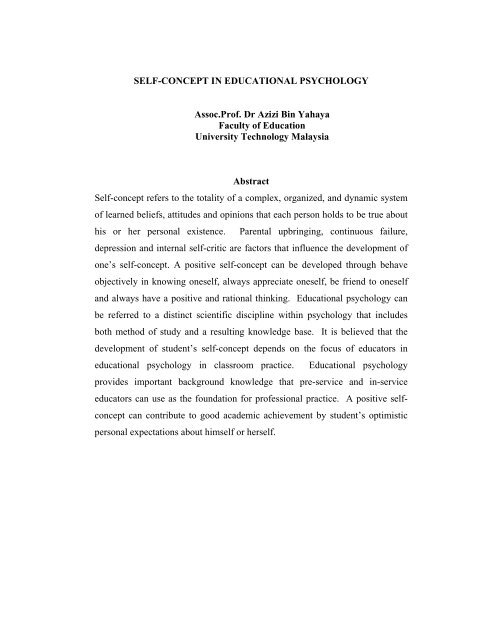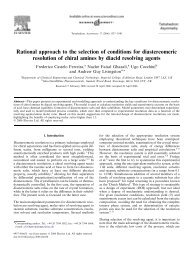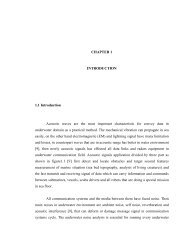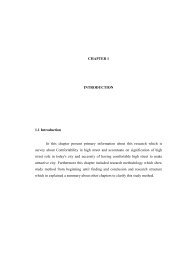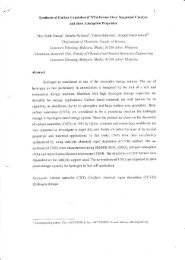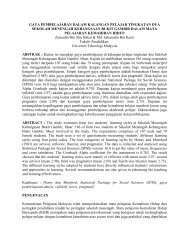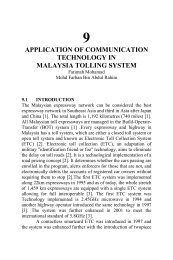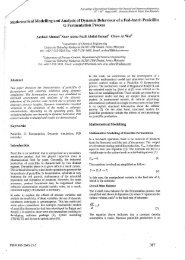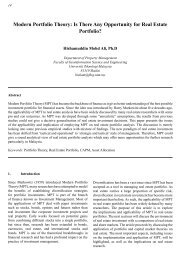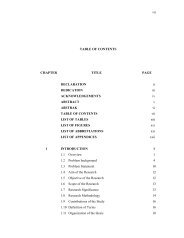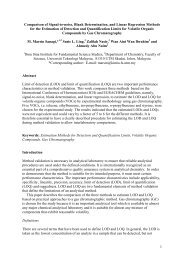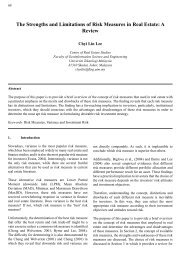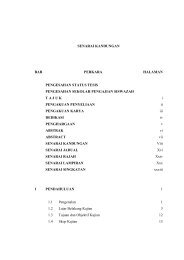SELF-CONCEPT IN EDUCATIONAL PSYCHOLOGY Assoc.Prof. Dr ...
SELF-CONCEPT IN EDUCATIONAL PSYCHOLOGY Assoc.Prof. Dr ...
SELF-CONCEPT IN EDUCATIONAL PSYCHOLOGY Assoc.Prof. Dr ...
Create successful ePaper yourself
Turn your PDF publications into a flip-book with our unique Google optimized e-Paper software.
<strong>SELF</strong>-<strong>CONCEPT</strong> <strong>IN</strong> <strong>EDUCATIONAL</strong> <strong>PSYCHOLOGY</strong><br />
<strong>Assoc</strong>.<strong>Prof</strong>. <strong>Dr</strong> Azizi Bin Yahaya<br />
Faculty of Education<br />
University Technology Malaysia<br />
Abstract<br />
Self-concept refers to the totality of a complex, organized, and dynamic system<br />
of learned beliefs, attitudes and opinions that each person holds to be true about<br />
his or her personal existence. Parental upbringing, continuous failure,<br />
depression and internal self-critic are factors that influence the development of<br />
one’s self-concept. A positive self-concept can be developed through behave<br />
objectively in knowing oneself, always appreciate oneself, be friend to oneself<br />
and always have a positive and rational thinking. Educational psychology can<br />
be referred to a distinct scientific discipline within psychology that includes<br />
both method of study and a resulting knowledge base. It is believed that the<br />
development of student’s self-concept depends on the focus of educators in<br />
educational psychology in classroom practice. Educational psychology<br />
provides important background knowledge that pre-service and in-service<br />
educators can use as the foundation for professional practice. A positive selfconcept<br />
can contribute to good academic achievement by student’s optimistic<br />
personal expectations about himself or herself.
A. DEF<strong>IN</strong>ITION OF <strong>SELF</strong>-<strong>CONCEPT</strong> AND <strong>EDUCATIONAL</strong><br />
<strong>PSYCHOLOGY</strong><br />
There are a variety of ways to think about the self. The most widely<br />
used term is self-concept and generally refers to the totality of a complex,<br />
organized, and dynamic system of learned beliefs, attitudes and opinions that<br />
each person holds to be true about his or her personal existence.<br />
Franken (1994) states that<br />
“there is a great deal of research which shows that the self-concept is, perhaps,<br />
the basis for all motivated behavior. It is the self-concept that gives rise to<br />
possible selves, and it is possible selves that create the motivation for behavior”<br />
We develop and maintain our self-concept through the process of taking<br />
action and then reflecting on what we have done and what others tell us about<br />
what we have done. We reflect on what we have done and can do in<br />
comparison to our expectations and the expectations of others and to the<br />
characteristics and accomplishments of others. That is, self-concept is not<br />
innate, but is developed by the individual through interaction with the<br />
environment and reflecting on that interaction.<br />
There are a several different components of self-concept: physical,<br />
academic, social, and transpersonal. The physical aspect of self-concept relates<br />
to that which is concrete: what we look like, our sex, height, weight, etc.; what<br />
kind of clothes we wear; what kind of car we drive; what kind of home we live<br />
in; and so forth. Our academic self-concept relates to how well we do in school<br />
or how well we learn. There are two levels: a general academic self-concept of<br />
how good we are overall and a set of specific content-related self-concepts that<br />
describe how good we are in math, science, language arts, social science, etc.<br />
The social self-concept describes how we relate to other people and the<br />
2
transpersonal self-concept describes how we relate to the supernatural or<br />
unknowns.<br />
Educational Psychology is a combination or overlapping of two separate<br />
fields of study. The first is psychology, which can be defined as the scientific<br />
study of the mind and behavior (or behavior and mental processes) especially as<br />
it relates to individual human beings. Note that it is the scientific study of mind<br />
or mental processes (covert or internal) as well as behavior (overt or external).<br />
People who study psychological phenomena are not necessarily limited to the<br />
study of human beings. (a large body of research relating to animals has been<br />
developed) Nor are they limited to only studying individuals. However, when<br />
studying groups of individuals, the focus is generally on how individuals<br />
perform within the group rather that the study of the group as a whole.<br />
Scientists who study animals and people in terms of group and institutionalbehavior<br />
generally align themselves with sociology while individuals who focus<br />
on human culture and belief systems generally align themselves with<br />
anthropology.<br />
B. COMPONENTS OF <strong>SELF</strong>-<strong>CONCEPT</strong><br />
This dynamic aspect of self-concept (and, by corollary, self-esteem) is<br />
important because it indicates that it can be modified or changed. Franken<br />
(1994) states<br />
“there is a growing body of research which indicates that it is possible to change<br />
the self-concept. Self-change is not something that people can will but rather it<br />
depends on the process of self-reflection. Through self-reflection, people often<br />
come to view themselves in a new, more powerful way, and it is through this<br />
new, more powerful way of viewing the self that people can develop possible<br />
selves” (Franken, R. 1994. p. 443).<br />
3
There are a several different components of self-concept: physical,<br />
academic, social and transpersonal. The physical aspect of self-concept relates<br />
to that which is concrete: what we look like, our sex, height, weight, etc.; what<br />
kind of clothes we wear; what kind of car we drive; what kind of home we live<br />
in; and so forth. Our academic self-concept relates to how well we do in school<br />
or how well we learn. There are two levels: a general academic self-concept of<br />
how good we are overall and a set of specific content-related self-concepts that<br />
describe how good we are in math, science, language arts, social science, etc.<br />
the social self-concept describes how we relate to other people and the<br />
transpersonal self-concept describes how we relate to the supernatural or<br />
unknowns.<br />
The relationship of self-concept to school achievement is very specific.<br />
General self-concept and non-academic aspects of self-concept are not related to<br />
academic work; general academic achievement measures are related moderately<br />
to academic success. Specific measures of subject-related self-concepts are<br />
highly related to success in that content area.<br />
If academic achievement leads to self-concept, but self-concept is a<br />
better predictor of being a low-track or high-track student, it would appear that<br />
there is some intervening variable. It’s mean the intervening variable is<br />
personal expectations.<br />
Gage and Berliner (1992), the research on the relationship between selfconcept<br />
and school achievement suggests that measures of general or even<br />
academic self-concept are not significantly related to school achievement. It is<br />
at the level of very specific subjects (e.g., reading, mathematics, science) that<br />
there is a relationship between self-concept and academic success. This<br />
suggests that success in a particular subject area is not really changing one’s<br />
self-concept but rather is impacting one’s expectation about future success<br />
based on one’s past experience.<br />
There is much discussion about what young people should do in their<br />
childhood and youth to prepare them for success in adulthood. Once we have<br />
determined the desired end results or the prerequisites for success, we need to<br />
4
determine the means or the conditions by which those can be brought about.<br />
Education and schooling are two terms that are often associated with these<br />
conditions.<br />
C. FACTORS THAT <strong>IN</strong>FLUENCE <strong>SELF</strong>-<strong>CONCEPT</strong><br />
The development of self-concept is through the learning process since<br />
childhood. A child surrounding, experiences and the style of parental<br />
upbringing also contribute a significant influence towards the development of<br />
self-concept. A child evaluate who they are through the response of their<br />
parents in every action that taken. If a child live in a confused and negative<br />
parental upbringing, as a result this child tend to develop negative self-concept.<br />
Negative parental upbringing can be shown through beating without mercy,<br />
neglecting, paying less attention, unfairness, humiliating and unsatisfactory<br />
towards their child’s attitude. When this occurs, they will assume these as a<br />
punishment caused by their fault or stupid ness. On the contrary, a positive<br />
parental upbringing will develop a positive self-concept.<br />
Self-concept is something very dynamic that can change from time to<br />
time. Some aspects of self-concept remain for a long period but others can turn<br />
the opposite way in few seconds.<br />
There are factors that influence the process of the development of selfconcept.<br />
The style of parental upbringing that has been mentioned before is a<br />
significant factor. Positive parental upbringing and attitude read by their<br />
children can develop a positive thinking and self-appreciation to themselves.<br />
Negative parental attitude create the assumption that a child is not appreciated<br />
and loved by their parent because of his self-weakness.<br />
The second factor is continuous failure in a child life. In this case,<br />
failure can be defined as unsuccessfully to please their parent or themselves. A<br />
continuous failure in a child life making him feels that they are useless.<br />
Gradually, negative self-concept is developed in this child. On the other hand, a<br />
positive self-concept is developed if a child sees failure is an opportunity for<br />
him to improve himself in every aspect of decision-making.<br />
5
The next factor is depression. People who suffer from depression tend<br />
to think and response negatively towards everything including evaluating<br />
themselves. They are wondering whether they can survive throughout their life.<br />
They can be super sensitive to what other people say about them or act towards<br />
them.<br />
Last but not least, internal self-critic is another factor that influence the<br />
process of the development of self-concept. We cannot deny that internal selfcritic<br />
is needed to evaluate every action and decision that we take in our life.<br />
Internal self-critic functioned as a regulator in every action taken and how we<br />
behave so that we can be accepted by the society around us and can adapt well<br />
within the society.<br />
D. DEVELOP<strong>IN</strong>G A POSITIVE <strong>SELF</strong>-<strong>CONCEPT</strong><br />
As mentioned before that self-concept is something very dynamic, there<br />
are few steps can be taken to have a positive self-concept.<br />
First, we must behave objectively in knowing ourselves. No matter how<br />
small the achievement or positive experience that we possess it must be<br />
appreciated. We must try to enhance our talent and self-potential. As it says,<br />
‘You can’t be all things to all people, you can’t do all things at once, and you<br />
just do the best you could in every way.’<br />
Secondly, we must know and always appreciate ourselves. There is no<br />
other person that can appreciate us more that ourselves. People who know how<br />
to appreciate themselves are the one that can see all the good and positive things<br />
within them and other people. So, if can appreciate other people, we also can<br />
appreciate ourselves.<br />
Thirdly, never be an enemy to us. People tend to blame themselves<br />
when conflicts arises between ideal expectation and the real self. When we<br />
become the enemy to ourselves, we can hardly see the good and positive side of<br />
ourselves. Gradually, they are mentally exhausted, frustrated and develop<br />
negative self-concept.<br />
6
The final step is to have a positive and rational thinking. The Buddha<br />
says, ‘We are what we think. All that we are arises with our thoughts. With our<br />
thoughts, we make the world.’ How powerful is our mind! The power of our<br />
thoughts depends a lot on how we think. If we can develop positive and rational<br />
thoughts, we are developing a positive self-concept. A positive self-concept<br />
person usually is a winner but a negative self-concept person is always a loser.<br />
E. CONCLUSION :<br />
As a conclusion, self-concept is very important and essential in<br />
developing a child personality. Parents have to consider various factors that<br />
influence the development of more positive self-concept. These factors are<br />
style of parental upbringing, continuous failure, depression and internal selfcritic.<br />
At school, the development of student’s self-concept depends on the<br />
focus of educators in educational psychology in classroom practice. A positive<br />
self-concept creates a positive classroom-learning environment that believed<br />
can contribute to good academic achievement by students.<br />
7
References<br />
Franken, R. (1994). Human motivation (3 rd ed.). Pacific Grove,<br />
CA: Brooks/Cole Publishing Co.<br />
Gage, N., & Berliner, D. (1992). Educational psychology (5 th ed.).<br />
. Boston: Houghton Mifflin.<br />
Huitt, W. (1999). Implementing effective school achievement reform:<br />
Four principles. Paper presented at the School Counseling<br />
Summit, Valdosta State University, Valdosta, GA, April 20.<br />
Huitt, W. (1998). Self Concept and Self –Esteem,<br />
http: //learningdomain.com<br />
Huitt, W. (1998). Why Study Educational Psychology.<br />
http: //learningdomain.com<br />
Purkey, W. (1988). An overview of self-concept theory for counselors.<br />
ERIC Clearinghouse on Counseling and Personnel Services, Ann<br />
Arbor, Mich. (An ERIC/CAPS Digest: ED 304630)<br />
8


